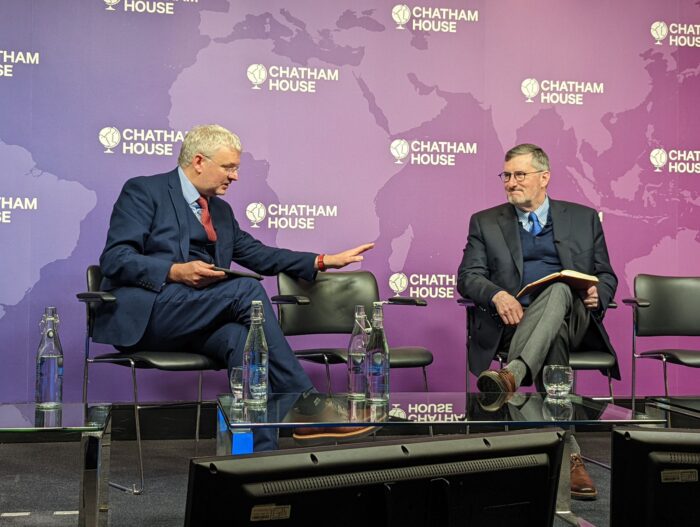On 2 May 2024, the World Refugee & Migration Council organized a major conference with Chatham House and its Russia-Eurasia and Global Economy and Finance Programmes in London to evaluate and discuss options for repurposing frozen or seized assets to compensate victims of aggression and corruption.
Watch the Conference Video
*use the icon in the upper-right of the video to navigate between different sessions.
Since the start of the full-scale invasion of Ukraine in 2022, some $300 billion of Russian state-owned foreign assets have been frozen in banks across the globe. As Europe tries to step up its military and economic support to Ukraine, the question of whether these could be used to finance Ukraine’s war effort and recovery becomes more pressing.
The moral, political and ‘urgency’ arguments for asset seizure are strong. But the question of confiscation has raised questions about the impact of such a move on international financial markets.
In this in-person event, experts discuss the arguments for and against repurposing frozen state-owned Russian assets; and if the assets are seized, how should the proceeds be distributed?
Welcome & Objectives
Creon Butler, Director, Global Economy and Finance Programme, Chatham House
The Hon Lloyd Axworthy, Chair, World Refugee & Migration Council; former Canadian Minister of Foreign Affairs
Keynote speech
Chrystia Freeland PC MP, Deputy Prime Minister and Finance Minister of Canada (online)
Chair: Bronwen Maddox, Director and Chief Executive, Chatham House
Session 1: The Theory and Practice of Repurposing Sanctioned Assets
- What are the main approaches that have been implemented and/or proposed to date (including Canada’s C19 legislation, the EU’s mechanism for confiscating income from sanctioned assets and various proposals for issuing bonds collateralised by sanctioned assets or the income they generate)?
- What are the main outstanding financial market, legal and political concerns with respect to these proposals? How do they vary with the objective of the sanctions or repurposing? What mitigations are available?
Tom Keatinge, Director, Centre for Financial Crime and Security Studies, RUSI
Alison Macdonald KC, Barrister, Essex Court Chambers
Philip Zelikow, Senior Fellow, Stanford University’s Hoover Institution
Tim Sargent, Former Associate Deputy Minister of Finance and Deputy Minister of International Trade, Canada
Chair: Creon Butler, Director, Global Economy and Finance Programme, Chatham House
High-level remarks
The Rt Hon Victoria Prentis KC MP, UK Attorney General (online)
Chair: Rashmin Sagoo, Director, International Law Programme, Chatham House
Session 2: The Application of Asset Repurposing to Ukraine
- How does the general framework discussed above apply in the case of Ukraine? Are there special factors for or against? Are there special mitigating actions?
- If sanctioned assets are repurposed for use in Ukraine, how can they be used most effectively (e.g. for current defence or future reconstruction)?
- What additional institutional arrangements do Ukraine and partner governments need to put in place to ensure effective governance and efficient handling of the financial flows from
repurposed assets?
Timothy Ash, Associate Fellow, Russia and Eurasia Programme, Chatham House, BlueBay Asset Management
Erki Kodar, Undersecretary for Legal and Consular Affairs, Ministry of Foreign Affairs of Estonia
Zakhar Tropin, Advisor to the Minister of Justice, Ukraine
Tatiana Khutor, Chairwoman, Institute of Legislative Ideas
David Jackson, Senior Adviser, U4 Anti-corruption Resource Centre
Chair: Orysia Lutsevych, Head, Ukraine Forum; Deputy Director, Russia-Eurasia Programme,
Chatham House
Closing remarks and next steps
Fen Hampson, Chancellor’s Professor, Carleton University; President, World Refugee & Migration Council
James Nixey, Director, Russia-Eurasia Programme, Chatham House
